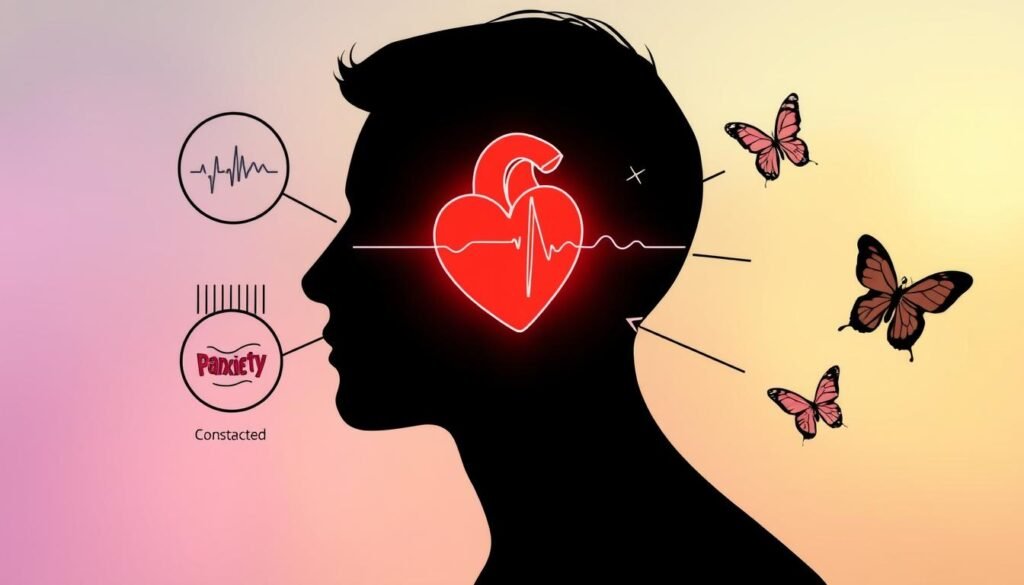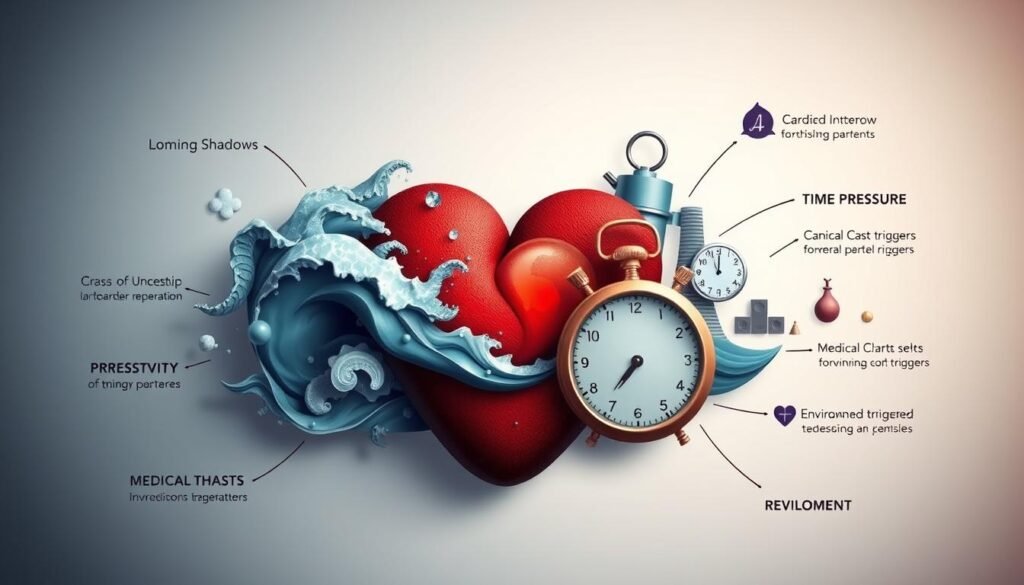Did you know people with coronary artery disease are more likely to get generalized anxiety disorder? This fact highlights the close relationship between heart health and anxiety. When dealing with heart conditions, feelings like fear and panic are common. They are due to the stress of dealing with the condition. And it’s not just in your head. These symptoms can show up in your body, making recovery harder.
It’s key to know when you’re dealing with cardiac anxiety. Knowing what you’re dealing with can help you find ways to handle it. This doesn’t only help your mind. It can make your heart healthier too. Sometimes, what looks like heart trouble might actually be anxiety. This mix-up can add to the stress. Knowing the difference helps you get the right support. For more on how anxiety impacts heart disease, see Johns Hopkins Medicine.
Key Takeaways
- Cardiac anxiety symptoms can significantly impact heart disease recovery.
- Understanding the link between anxiety and heart health is crucial for patients.
- Panic attacks and heart attacks can share similar symptoms, making differentiation challenging.
- Effective anxiety management can enhance overall quality of life for heart patients.
- Seeking professional help for anxiety disorders is vital for improved outcomes.
Understanding Cardiac Anxiety and Its Impact
Cardiac anxiety is a major issue for people with heart problems. It deeply affects their health and healing after heart incidents. It is found that 20-30% of patients feel more anxious after acute coronary syndrome. Also, 25% awaiting coronary artery bypass surgery report higher anxiety. These numbers show how closely worry and heart disease are linked.
The Connection Between Anxiety and Heart Disease
There is a complicated link between anxiety and heart disease. Studies reveal that generalized anxiety disorder is common among heart patients. This condition worsens heart health outcomes. Those who have had heart failure are often more anxious. In fact, about 32% report serious worry, with 13% having an anxiety disorder. This highlights the need to take care of mental health in heart patients.
Natural Responses to Heart Conditions
Facing heart problems naturally brings anxiety. This can lead to physical symptoms like rapid heartbeats. About 20% of severe heart failure patients needing help from devices feel anxious. Anxiety increases the danger of more heart issues and even death, especially with existing heart disease.
Identifying Cardiac Anxiety Symptoms
It’s key to know the signs of cardiac anxiety to manage it well. Many suffer symptoms due to worries about their heart’s health. Learning about these symptoms helps people deal with cardiac anxiety.
Common Signs of Cardiac Anxiety
Cardiac anxiety signs are:
- Persistent worry about health and the heart
- Fear of another heart event
- Avoiding activities that seem to trigger heart symptoms
- Often visiting doctors for reassurance
Symptoms of heart anxiety show up more in those stressed or with heart disease in the family. This can cause much emotional and physical pain.
Emotional and Physical Symptoms
It helps to know both emotional and physical symptoms of cardiac anxiety. Emotionally, people may feel:
- Irritability
- Sadness
- Restlessness
Physically, they often face:
- Rapid heartbeat
- Chest pain
- Shortness of breath
- Fatigue
- Trouble sleeping
Noticing these signs is crucial for getting the right support. For more details, check out insights on anxiety and heart issues.

Recognizing Cardiac Anxiety Symptoms
Understanding how anxiety and heart problems are connected is key. Many people get mixed up because anxiety signs can seem like heart issues. For instance, chest discomfort and shortness of breath can come from both. Recognizing cardiac anxiety is about seeing these similar signs. This includes unusual heart rhythms and feeling dizzy.
How Anxiety Symptoms Mimic Heart Conditions
Anxiety signs often look like heart condition signs, which makes diagnosing hard. Anxiety and panic attacks can cause the heart to beat weirdly. This might feel like heart flutters or even cause serious issues like atrial fibrillation, leading to swelling in legs and belly. Women might have unique signs like feeling sick and very tired, which can be confused with heart problems. So, it’s vital to see the small differences if you’re feeling unwell.
Screening for Anxiety Disorders
Screening for anxiety means looking closely at how often and how long symptoms show up. Doctors might use a heart monitor for a while to check if the problem is anxiety or heart rhythm issues. They might also do tests to figure out why someone feels heart flutters or dizzy. By doing detailed checks, doctors can create the right care plan, making sure patients get the help they need for their specific situation.
Factors Contributing to Cardiac Anxiety Disorder
Cardiac anxiety disorder comes from many factors that impact a person’s mind and body. Knowing these factors helps in spotting who might be at risk and coming up with ways to help them.
Pre-existing Conditions
Having an anxiety disorder already puts someone at a higher chance of getting cardiac anxiety disorder. Issues like generalized anxiety disorder and panic disorder can make someone more aware and scared about their heart health. It’s crucial to see how past mental health problems can make heart-related anxiety worse.
For example, anxiety can make your heart rate and blood pressure go up. This can cause more heart problems for people who already have heart disease risks.
Life Changes and Traumatic Events
Big changes in life or shocking events can also trigger cardiac anxiety disorder. Experiences like heart attacks or major surgeries can make someone very anxious about their heart. About 20-30% of people who’ve had a heart event feel more anxious afterwards. Knowing about these events is key in finding out who needs more help to recover.

| Contributing Factors | Examples | Effects on Cardiac Anxiety |
|---|---|---|
| Pre-existing Conditions | Generalized Anxiety Disorder, Panic Disorder | Increase in heart-related anxiety |
| Traumatic Events | Heart attacks, major surgeries | Higher anxiety reactions |
| Personality Traits | Conscientiousness, Neuroticism | Different effects on anxiety levels |
| Life Changes | Divorce, loss of a loved one | Lead to sudden anxiety bursts |
Types of Anxiety Disorders Related to Cardiac Symptoms
People with heart problems sometimes face different kinds of anxiety disorders. Two common ones are panic disorder and post-traumatic stress disorder (PTSD). Knowing about these can help provide the right support and care.
Panic Disorder and Its Effects
Panic disorder causes sudden, intense episodes of fear. These peak quickly. Many believe they’re having a heart attack during these attacks. This belief fuels their health anxieties. This cycle affects their health and worsens heart symptoms.
Post-Traumatic Stress Disorder (PTSD) in Heart Patients
PTSD happens after scary life events, including severe heart issues. It brings back bad memories and stress. People feel helpless about their health. PTSD in heart patients lowers their mental and physical health. It makes recovery harder and raises the chance of getting other anxiety problems.

| Type of Anxiety Disorder | Common Symptoms | Impact on Cardiac Health |
|---|---|---|
| Panic Disorder | Recurrent panic attacks, rapid heartbeat, sweating, hyperventilation | Increased cardiovascular stress, misinterpretation of symptoms as heart attacks |
| PTSD | Flashbacks, severe anxiety, emotional numbness | Elevated heart rate and blood pressure during anxiety triggers, greater psychological distress |
It’s crucial for healthcare workers to understand these anxiety disorders. They can then create better treatments. Combining mental health care with heart treatment can lead to better patient outcomes.
The Effect of Anxiety on Recovery from Heart Issues
When dealing with heart problems, anxiety can play a big role in recovery. High levels of anxiety might make it hard for patients to stick to their treatments. They may find it challenging to take their medication as directed or to keep up with needed rehab sessions. This can slow down their recovery and lead to more health issues.
Impact on Treatment Compliance
Feeling anxious makes it tougher for patients to follow their treatment plans. Research shows that one out of five heart patients in the hospital also have depression. Also, 30% to 40% of people getting heart bypass surgery feel depressed or anxious. It’s crucial to address these feelings to help patients recover better and lower their risk of more heart trouble.
Challenges in Lifestyle Changes and Support Systems
Making healthy changes is hard for patients who are anxious. It can be hard for them to eat right or exercise regularly. Emotional stress also makes it difficult to keep up strong relationships with family and friends. Almost one out of three people who have had a cardiac arrest show signs of PTSD, adding another hurdle to their recovery path.
Cardiac rehab programs can help reduce the impact of these issues. These programs offer education on managing emotions, supervised exercise, and support. By taking part in activities that matter, patients can lessen symptoms of depression and anxiety, helping their recovery.
| Statistic | Impact |
|---|---|
| 30% – 40% undergo heart bypass surgery face anxiety | Increased risk of low treatment compliance |
| 1 in 8 heart attack survivors experience PTSD | Emotional challenges affecting daily life |
| One in five patients diagnosed with depression post-event | Higher risk of subsequent cardiac events |
| Participating in cardiac rehab reduces depressive symptoms | Improves overall health outcomes |
Cardiac Anxiety Treatment Options
Addressing cardiac anxiety often requires a multifaceted approach. Understanding the options available helps individuals navigate their treatment effectively. Both cognitive-behavioral therapy (CBT) and medication play crucial roles in managing this condition. With professional guidance, tailored plans can lead to significant improvements in the quality of life.
Cognitive Behavioral Therapy (CBT) Techniques
CBT techniques are especially valuable for those dealing with cardiac anxiety. This form of psychotherapy focuses on identifying and restructuring negative thought patterns. Techniques often include:
- Exposure therapy to gradually confront fears
- Relaxation techniques to alleviate stress reactions
- Thought records for tracking irrational beliefs
Implementing these CBT techniques aids in reducing anxiety symptoms. It allows individuals to regain a sense of control over their lives. Professionals trained in CBT can offer customized strategies for each patient’s unique situation.
Medication and Professional Guidance
For some, medication for anxiety is a necessary component of comprehensive cardiac anxiety treatment. Options such as antidepressants and anti-anxiety medications can stabilize symptoms and enhance the effectiveness of CBT techniques. Seeking professional guidance ensures that individuals receive appropriate prescriptions tailored to their needs.
Collaborating with healthcare providers enables a holistic approach to treatment. Regular consultations can help assess progress and make adjustments as needed. Resources like the WebMD provide additional insights into managing anxiety in the context of heart health.
| Treatment Method | Description | Effectiveness |
|---|---|---|
| CBT Techniques | Psychotherapy focused on changing negative thought patterns and behaviors | Effective for many patients in managing anxiety symptoms |
| Medication for Anxiety | Prescription drugs including antidepressants and anti-anxiety medications | Helps stabilize severe anxiety symptoms |
| Professional Guidance | Support from healthcare providers in therapy and medication | Critical for successful management of anxiety and heart health |
Through a combination of CBT techniques, medication for anxiety, and professional guidance, individuals can effectively manage cardiac anxiety and improve their overall well-being. Emphasizing these treatment options promotes a proactive stance toward mental health in the context of heart issues.
Managing Cardiac Anxiety Symptoms Effectively
Managing cardiac anxiety symptoms well is key for good health. Using self-care, stress management, and support from others can improve life quality.
Self-Care Strategies and Stress Reduction
Self-care is crucial in handling cardiac anxiety. Mindfulness, exercise, and eating well boost emotional health. Stress-relief methods like yoga, meditation, and deep breathing help lower anxiety. These practices lead to better health.
Importance of Social Support and Connections
Having support is vital when dealing with anxiety. Being with family, friends, or joining groups gives emotional and practical help. This network creates a place to share feelings about cardiac anxiety, easing loneliness.
Overall, using self-care, stress management, and getting support changes the fight against cardiac anxiety. Knowing when to get professional advice is important too. It helps with better handling of symptoms over time.
Conclusion
Knowing how to handle cardiac anxiety symptoms is key for people with heart conditions. About 24.9% of people will face anxiety at some point. This can make heart disease feel even harder. Learning how anxiety and heart health are linked helps detect symptoms early. This leads to better treatment and outcomes for both mind and heart.
Those with congestive heart failure face anxiety 60% more often than those without. With anxiety common worldwide at 16.6%, finding ways to manage it is crucial. Using self-care and relying on support can improve coping skills. This lets individuals lead happier lives, even with anxiety’s challenges.
For heart patients, understanding anxiety’s effects is important. Knowing signs like chest pressure helps tell anxiety from serious heart issues. It’s also key to know what causes anxiety and how to handle stress. These steps are essential for better heart health. For deeper knowledge, check out this resource.